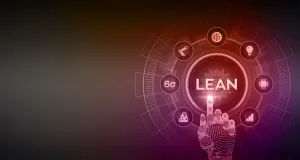It's always a time of learning and looking forward here on tech Lyceum, Hello. My name is Neerja, and on this episode, we talk about how it OT enhances lean manufacturing, reducing waste and boosting efficiency. This year is the future of technology, and that's something we're going to be looking into today with our two expert speakers. We have Pushkar Soman, Senior Director, client partner manufacturing, with over 20 years of experience. Pushkar is a masterful communicator who excels on both strategic and operational levels. He has a proven track record of saving clients over $20 million and driving growth between 15% to 25% by leveraging technology services to enhance business value. His expertise spans consulting, front end, client management, operations and delivery management. Pushkar, thank you for taking the timeout to be here. It's a pleasure.

Thank you, Neerja, it's a pleasure to be here, and I look forward to this very interesting session.
Also joining us is Shamdutt Kamble, AVP, Global Practice, head digital manufacturing, with nearly 30 years of rich experience in Smart Manufacturing, digital twin industrial automation analytics, Shamdutt has successfully driven numerous plants of the future initiatives, right from building strategy to execution and implementation across the manufacturing domain. Shamdutt, it is good to have you back. Thank you for joining us once again.
Thanks, Neerja, I mean, excited to be part of this session, looking forward for these discussions.
Alright. Pushkar, my first question is for you,
Q: What challenges do manufacturing companies commonly face when trying to implement lean manufacturing principles?
Well, that's a great question, Neerja, and it is really very important for us to understand, what are the common challenges faced during a typical lean implementation, and these challenges are many. So what happens? And what we've seen typically happen is companies come across multiple challenges which can hinder the successful adoption of a lean implementation, or a Lean culture, because Lean is a culture. It's a way you look at the process. Some of the key challenges include there's a cultural resistance to change, which is very natural, because what people do and how people do their work changes. That makes a lot of people very insecure, and they therefore start resisting that change. So that's one of the biggest resistance that needs to be overcome. We also see a lack of leadership commitment. So the leadership is fully committed when the Endeavor starts. But you know these, some of these endeavors take time, depending on the complexity of your organization. So if the leadership is not sustained, or the commitment is not sustained, then over a period of time, you know, you may not get the fruits of the lean implementation, one of the biggest areas where we where we see a lot of companies struggle, is to identifying value and eliminating waste. Because it is paramount in lean to identify value, and that value needs to be understood by all. So unless that happens, you really cannot proceed in with a lean implementation. Some of the other challenges that we see are choosing the right metrics, because if you don't choose the right metrics to measure success, you're not going to get what you really want. These, in short, are some of the challenges that we see companies face when they embark on their journey to implement lean manufacturing principles,
Right, Thank you, Pushkar for laying those out. And Shamdutt, now that we've talked about the challenges,
Q: Could you tell us how IT companies can actually help manufacturers overcome these challenges, specifically through the use of IoT technology.
Sure Neerja, So getting from lean manufacturing to digital lean manufacturing is actually the foundation for getting your factory to make it more smart manufacturing factory, or the lean or adaptive factories, okay? And that said, directly enables us to it. Number one is your It OT convergence. Okay, that's where the IoT technology starts coming in, connecting your machines processes and operations together, where you start collecting the data coming from different sources to understand the how is your machines or the systems performing? Where are the losses happening and then competing and monitoring your KPI? So that's number one. Number two is how you can standardize your processes. Okay, that's very core, or fundamental to this whole processes. When I say standardization means how can my process. Behave exactly the same to any inputs that's been put into it, or any lower variations or the environmental change that's happening. How it can be exactly the same? How can I standardize the process in terms of digitizing the activities of the process, connecting my operators in terms of having detail work instructions, having guided procedure checklist to carry out my, let's say, quality inspections or any operations right, or to get the recommendations or suggestions from the systems based on the context at which I am operating the process, or in a given disturbance, or disturb, I would say, disturb conditions of the processes. So these are the standardizing the process that step two and the step three is building the digital technology platform, where just I spoke about getting the data coming from different sources, doing the data analysis for the losses, whether it's your process loss or your machine losses, doing the analytics like predictive, prescriptive, getting the dynamic root causes to it, and getting the insights and intelligence, and feeding back this intelligence and insights into a system of operations to optimize your performance using the best.
Thanks, Shamdutt. Pushkar, let me come back to you here. You know when we talk about the way in which one should go about this typically,
Q: How long does it take to implement IT Solutions for lean manufacturing, and what obstacles might arise during this process?
Well, that's another great question, Neerja, and as we know, the core lean manufacturing in terms of operations or leaning out your processes, almost every company has done it, and they are at different stages of evolution in that process. So the companies are now trying to adapt or implement technology to help or x to help them accelerate the benefits that they derive from the Lean principles, other than the challenges that you spoke about, which are generally challenges like cultural challenges and, you know, leadership commitments, some technology specific issues that we have seen hinder the progress are data integration issues. So integrating the new IT systems with the existing data systems can be complex, and you know, if it's not done right, then it doesn't give you the right results. We've seen a lot of companies struggle to choose the right tools to match their maturity in the Lean process that they have. So if you don't choose the right tools, or you don't train your people on using the tools correctly, that, again, is not going to help you. For Change Management lean in any any IT implementation and any transformational IT implementation, needs a lot of change management. If that is not handled properly, then you're not going to get the results. We've also seen data quality issues sometimes crop up, and you know, those can be from minor to, you know, major, issues that can lead to unreliable analysis and data making. So you make sure your data is in order, you have you know how to integrate various systems, and you need the right tools, and you need the right training for the people who are going to use the tools. Those, I would say, are broadly the big challenges from a technology standpoint that companies face as they embark on this journey.
Right, Well, with any good conversation about a topic of this nature, it's always helpful to understand the concept with some examples. So Shamdutt, if I can bring you in here,
Q: Could you share some examples of successful implementations? What benefits have customers actually experienced firsthand from integrating it with Lean Manufacturing?
Sure. So Birlasoft is engaged with its partners and its customers to help them into the journey of industry four.org and we have been implementing the solutions to many discrete industries and process industries. One of the example I would just like to bring in where the end results were very profound and it really wowed our customer is the automotive manufacturer where we implemented the digital lean solutions. And with the starting point for this was getting the real time visibility to connect all the processes and machines and then further connect your plants. And one of the objective of our customer was to have the carbon footprint reduction, then measuring the energy and then collecting the energy data at different level, like machine processes and operations. So that was our starting point to help him to give the real time visibility in understanding how is the processes and machines behaving. Where are the losses that. Are contributing to the efficiencies, loss in efficiencies, or adding to the non productive activities. So that was the starting point. And once we had this data collected, which was then further built with a detailed manufacturing platform to further ingest this data, process this data, do the analysis, as I talked about, doing the predictive prescriptive analytics and then feeding back this data into their production control process processes, quality control processes, inventory control processes, and then to the maintenance processes to help them get the real time visibility make their process transparent and effectively have this closed loop feedback. The result of that was they were able to improve their OEE, which is the any you know, it's a fundamental metrics to any manufacturing company to improve by 15 to 25% and This, in turn, help them reduce their production cost from somewhere to 25 to 30% and help improve the sustainability energy, in this case, by 10 to 15% okay, and the solution was built in such a way that this whole solution was further rolled out into from about 22 plants. So this how they were able to get their goals. And of course, as I said, it's not about the technology, it's all about where they want to see the value to be improved, which will help enhance and meet their business goals.
Well, Thank you, Shamdutt, as always, an excellent conversation about the innovations in this industry. Pushkar, Shamdutt ,before we close the curtains on this episode.
Q: What are your final thoughts on the subject? Pushkar, why don't you start us off.
So, Lean is vital. Lean is important for every manufacturing organization. Almost every manufacturing organization has started implementing lean in its core operations to some extent or the other, as companies now look at technology enabling and, you know, accelerating this Lean journey, it is important to understand any cultural resistances that may exist in the organization. It is important for the leadership to stay committed to this exercise and stay involved as they go through the process, and from a technology standpoint, make sure your data integration and data quality issues are taken care of. Otherwise really do not get the benefits that one would otherwise get from a lean implementation. So be ready, be prepared for a long journey. It's not a quick slam dunk. This takes time, and it takes a lot of patience.
Well said, Pushkar. And Shamdutt, your final thought.
Yeah. So I just add to what Pushkar was saying two things, primarily, I would say there are many, but two things which comes to my mind predominantly, is one, focus on value. Second, technology comes second. Okay, so that's number one. Number two is the change management, which is absolutely important if you want to drive this digital transformation, we definitely require a strong commitment from the top management to drive this change, to make it more effective and to get what the results were expected or what was planned.
Okay, Thank you, Pushkar and Thank you Shamdutt, for giving us all this food for thought, and we hope to catch you again on tech Lyceum,
Sure. Thank you.
Thank you, Neerja, thank you very much.
So here's hoping you're taking plenty away from this conversation, a very interesting concept, and my thanks to our guests for laying it all out there and explaining it as clearly as possible. We will be back with more episodes on tech lyceum. Until then, it's me Neerja, signing off. Bye.




